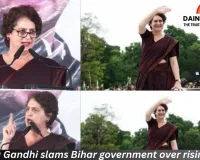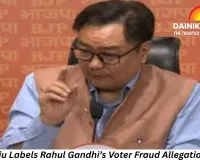Rajasthan Government Moves to Amend 30-Year-Old Two-Child Rule for Panchayat, Urban Body Elections
Digital Desk

The Rajasthan government has initiated steps to remove the three-decade-old two-child restriction for contesting Panchayat and urban local body elections. The rule, in place since 1995, currently bars candidates with more than two children from contesting posts such as Sarpanch and municipal chairpersons.
A draft ordinance to repeal this restriction has been sent to the Law Department after proposals from the Panchayati Raj and Local Self-Government Departments. Once approved by the Law Department, the ordinance will be placed before the Cabinet and, upon approval, issued officially. Amendments to the Panchayati Raj Act and the Municipal Act will follow, formally eliminating the two-child condition. Officials indicate that the ordinance could be enacted this month, with bills expected to be introduced in the Assembly during the budget session for final approval within six months.
The original provision was introduced during the tenure of then Chief Minister Bhairon Singh Shekhawat in 1995 to limit family size among local leaders. Removing this restriction is expected to reshape local politics, allowing leaders with three children, many affiliated with BJP and Congress, to contest elections after being previously barred.
The move responds to long-standing demands from political leaders and social organizations advocating for the change. Independent MLA Chandrabhan Singh Akya had raised the issue in this year’s budget session, highlighting that the restriction applies to local elections but not to Assembly or Lok Sabha polls. Parliamentary Affairs Minister Jogaram Patel confirmed that the government considers the matter serious and is taking action.
Supporters of the amendment argue that it will broaden the pool of eligible candidates, enhance participation in local governance, and correct what they see as an outdated rule. Critics, however, caution that the removal could revive concerns about population control measures at the grassroots level.
If implemented, the ordinance will mark a significant policy shift in Rajasthan’s Panchayati Raj and urban governance, potentially influencing candidate eligibility and political strategy in upcoming local elections.










